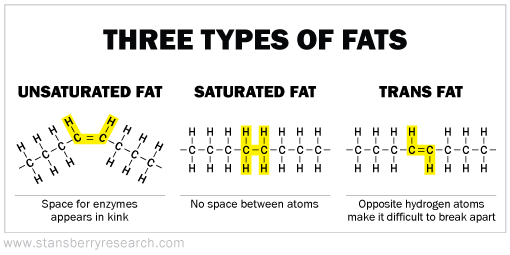I'm about to give you some controversial advice: You need to eat fat.
Last week, we shared a piece on the problem with low-fat diets. We explained that there are certain fats to embrace... and certain ones to avoid. Today, we're going to break down the difference and show you how to add healthy fats to your diet.
There are three main types of fats:
- Unsaturated fats
- Saturated fats
- Trans fats
All fats consist of chains of carbon atoms with attached hydrogen atoms. Take a look:

Unsaturated fats are the easiest for us to break down – just look at that space in the middle. It allows enzymes to get in and break down the fat more easily.
Unsaturated fats occur in plenty of natural foods... They consist of monounsaturated fats ("MUFAs") and polyunsaturated fats ("PUFAs").
MUFAs have a single double bond (highlighted in the figure), whereas PUFAs have more than one – the more spaces, the easier they are for your body to break apart and use.
MUFAs, PUFAs, omega-3s, and some omega-6s are great for your health. MUFAs keep our insulin levels in check. And as we've said many times about the good fats in olive oil, they protect your heart as well (which could explain why the overweight women in Keys' study, which we told you about on Tuesday, had low rates of heart disease).
Saturated fats occur both naturally (in foods like avocados) and as a chemical product (in foods like margarine). The problem is the evidence isn't clear on how much (if any) damage they might do.
Part of the concern regarding saturated fats is that some types may be worse than others. Newer research suggests that it depends on how long the carbon chain is. It's one of the reasons coconut oil became popular – because it's a medium-chain saturated fat. Unlike long-chain saturated fats, the liver breaks down medium-chain fats easily.
This goes along with what I've always said, too: Natural sources are better than processed foods. This holds true for saturated fats. So don't cut out foods like avocados, whole milk, red meat, and cheese just because of the saturated fats.
On the other hand, it's clear that trans fats are terrible for you. The vast majority are man-made (a few occur naturally in beef, lamb, and butterfat). They're difficult for your body to break down. (The enzymes don't have enough space to get in there to break it apart.) And they send your immune system into overdrive, promoting inflammation and wreaking havoc on your body.
Researchers from Harvard found that people who ate "bad" fats – especially trans fats –lowered their life expectancy. Researchers followed about 125,000 people over the course of 30 years. What they found was that, when measuring calorie intake, every 2% increase in the amount of trans fats that people ate corresponded with a 16% higher risk of early death.
However, they also found the more polyunsaturated and monounsaturated fats people consumed, the lower their risk of early death. This is why eating the right kind of fats is critical.
How to Get the Right Fats
1. Check food labels for trans fat. Thanks to the Food and Drug Administration ("FDA"), trans fat amounts must appear on food labels. It's below the line for "Total Fat."
2. Cook with olive oil or other preferably monounsaturated fats.
3. Avoid restaurants that still cook with trans fat. Popeyes and Buffalo Wild Wings are two of the biggest culprits.
Also, steer clear of anything with these words on the label:
- Hydrogenated oil
- Partially hydrogenated oil
And while you're reading labels, avoid these sugars as well:
- High-fructose corn syrup
- Fructose syrup
- HFCS-90
- Maize syrup
- Glucose/fructose syrup
- Crystalline glucose
- Tapioca syrup
- Dahlia syrup
In general, foods high in trans fats include baked goods (particularly commercially made ones), margarine, snack foods, and fried foods.
My one rule is simple... Empower yourself to take control of your own life. When it comes to your diet and making good food choices, figure out what works best for you.
Read food labels. Enjoy natural fats. Eat some red meat. Get as many whole veggies and fruits (not juice) as possible. Drink a bit of wine. And no matter what, don't fall for an all-or-nothing type of diet.
Moderation is key. This is the hallmark of my philosophy in Retirement Millionaire. Every month, I bring you the latest on health and personal finance along with my best investment recommendations and market insight. If you're not a subscriber yet, click here to learn more.
What We're Reading...
- How to really read food labels.
- Something different: Why finding water on the moon matters.
Here's to our health, wealth, and a great retirement,
Dr. David Eifrig and the Health & Wealth Bulletin Research Team
October 29, 2020
